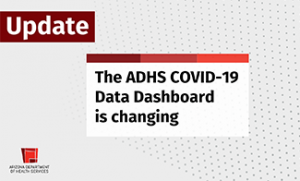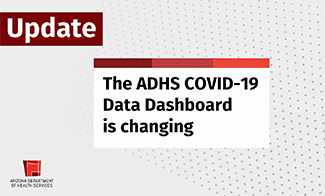 Throughout the pandemic, your state government and Arizona’s hospitals have worked together to provide data critical to understanding and responding to the invisible enemy that is COVID-19.
Throughout the pandemic, your state government and Arizona’s hospitals have worked together to provide data critical to understanding and responding to the invisible enemy that is COVID-19.
This partnership has made the ADHS COVID-19 Data Dashboard a go-to resource for the public, news media, and Arizona leaders. Updated daily and enhanced many times over these many months, Arizona’s public dashboard has earned an A-Plus grade from the COVID Tracking Project.
Much of this data, including that provided by hospitals, is available because of an Enhanced Surveillance Advisory made possible by an executive order issued by Governor Doug Ducey. This daily reporting requires a great deal of work on the part of hospitals, ADHS, and others, and it has been time and effort well-spent.
Changing such a widely used resource isn’t something to be done lightly. But now, with all COVID-19 metrics steadily declining and many other states doing the same, I join with the hospital representatives below in sharing that it’s the right time for a change.
Starting in March, the frequency of reporting reflected on the ADHS COVID-19 Data Dashboard will shift to weekly. As a result, data on the dashboard will update each Wednesday starting March 2. Saturday, Feb. 26, will have the last daily update.
At least 34 states don’t do daily COVID-19 data reporting, according to the Association of State and Territorial Health Officials, and this new weekly cadence will align with other disease reporting in Arizona. Weekly updates also will reduce understandable confusion that happens when variability in data inputs and-or processing result in an unusually high or low number of cases, deaths, or other information added to the dashboard on a given day.
The state and our hospitals are proud of what this data reporting effort has meant to all Arizonans during such a challenging time. We look forward to this partnership continuing to keep all of us informed while acknowledging that the COVID-19 pandemic is moving toward a new phase for which weekly reporting can provide the information we all need to make informed decisions.
Dr. Richard Carmona, M.D., MPH, FACS
17th U.S. Surgeon General
Special Adviser to Governor Doug Ducey
on Public Health Preparedness
Dr. Amy Beiter, M.D., MBA
Chief Medical Officer
Tucson Medical Center
Dr. Marjorie Bessel, M.D.
Executive Vice President and Chief Clinical Officer
Banner Health
Dr. Alyssa Chapital, M.D., Ph.D.
Hospital Medical Director
Mayo Clinic
Dr. Alan DeWitt, M.D.
Chief Medical Officer
Summit Healthcare Regional Medical Center
Dr. Bill Ellert, M.D.
Chief Medical Officer
Abrazo and Carondelet Hospitals
Dr. Barbara Hartley, M.D.
Chief Medical Officer
Benson Hospital
Dr. Stephen Heffington, M.D.
Chief Medical Officer and Clinical Director
Hopi Health Care Center
Dr. Stephanie Jackson, M.D.
Senior Vice President and Chief Clinical Officer
HonorHealth
Dr. Edward Miller, D.O., FACOG
Chief Medical Officer
Copper Queen Community Hospital
Dr. John Mougin, M.D.
Physician Executive, Quality and Safety
Northern Arizona Healthcare
Dr. Gregory Nelcamp, M.D., MBA
Chief Medical Officer
Kingman Regional Medical Center
Dr. Michael Ritchey, M.D.
Chief Medical Officer
Phoenix Children’s Hospital
Dr. Brian Tiffany, M.D., Ph.D.
Chief Medical Officer, Southwest Division
Dignity Health
Dr. Michael D. White, M.D., MBA
Executive Vice President and Chief Clinical Officer
Valleywise Health










